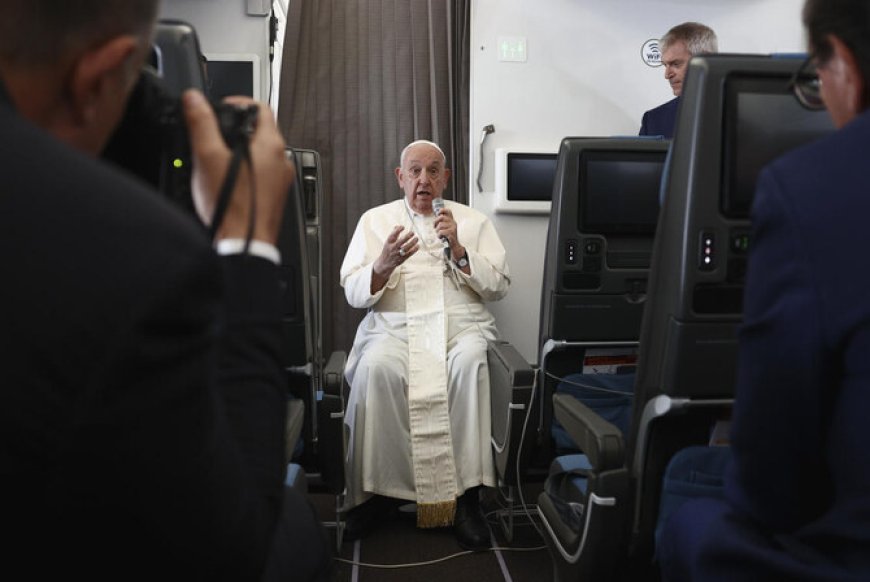Opinion: Pope Francis' Outcry Over Gaza's Children – A Moral Voice Amid Global Inaction
Pope Francis' recent condemnation of the deaths of Palestinian children in Gaza, killed during Israeli bombings, is a sobering reminder of the ongoing humanitarian catastrophe in the region. His voice, often regarded as a moral compass in times of crisis, calls attention not only to the immediate tragedy but also to the global failure to protect the most vulnerable – children.

Pope Francis' recent condemnation of the deaths of Palestinian children in Gaza, killed during Israeli bombings, is a sobering reminder of the ongoing humanitarian catastrophe in the region. His voice, often regarded as a moral compass in times of crisis, calls attention not only to the immediate tragedy but also to the global failure to protect the most vulnerable – children.
The pope's comments, made aboard his flight back to Rome after a grueling 12-day tour of Southeast Asia and Oceania, reflect his deep disillusionment with the current state of the Israel-Hamas conflict. "I do not think that they are taking steps to make peace," he lamented, pointing out the cyclical violence and the lack of meaningful efforts to end the bloodshed. His daily conversations with members of a Catholic parish in Gaza underscore the gravity of the situation on the ground. “They tell me ugly things, difficult things,” he said, describing the devastating impact of Israeli airstrikes, particularly on schools and civilian infrastructure, where children have often been the unintended victims.
The Human Cost of Conflict
In this ongoing war, initiated by Hamas’ brutal attack on October 7, 2024, the human toll has been staggering. Israel’s immediate retaliation, a military campaign that has reduced much of Gaza to rubble, has killed over 41,000 Palestinians according to Gaza’s health ministry. The pope’s sorrow over the loss of children’s lives shines a light on the broader devastation affecting civilians, often caught in the crossfire of geopolitical and military calculations. His description of bombed schools under the “presumption” of targeting militants is a powerful critique of how warfare too easily dehumanizes and justifies the loss of innocent life.
The sheer scale of destruction in Gaza has left the international community grappling with the question of proportionality in Israel’s response. While Israel has every right to defend itself from Hamas’ aggression – a sentiment the pope himself shares – the overwhelming force it has used has decimated an already impoverished population, many of whom had no part in Hamas' actions. Pope Francis' call for a ceasefire is a desperate plea for the protection of civilians and for an end to the suffering of Gaza’s children, who have become the most tragic symbols of this conflict.
A Call for Accountability and Compassion
Pope Francis’ remarks are not new; he has consistently advocated for peace in the Middle East, calling for dialogue and reconciliation even as the violence escalates. However, his words now carry a heightened urgency. With each passing day, the devastation in Gaza worsens, and the hope for a diplomatic resolution grows dimmer. His critique of both sides — Israel and Hamas — for their apparent unwillingness to seek peace reflects a growing frustration with global inaction.
While the world watches the devastation unfold, the United Nations has declared Gaza’s economy "in ruins," further deepening the humanitarian crisis. The pope's emotional appeal for peace is a direct challenge to global leaders to move beyond rhetoric and take tangible steps toward ending the violence. His insistence on protecting civilians, especially children, highlights the moral responsibility of all nations to prioritize human lives over political gains.
A Broader Moral Agenda
Beyond the Israel-Hamas conflict, Pope Francis’ 11-year papacy has been marked by his advocacy for the marginalized, including migrants and victims of abuse. His outcry over Gaza’s children is part of a broader pattern of standing up for those who have no voice on the global stage. Whether addressing the plight of migrants attempting dangerous sea crossings or condemning clergy abuse scandals within the Catholic Church, Francis has consistently prioritized the dignity and protection of the vulnerable.
The pope’s moral agenda extends even to issues like the Vatican’s controversial deal with China over the appointment of Catholic bishops, a subject that also surfaced during his in-flight press conference. Francis defended the deal, which has drawn criticism from conservative Catholics, as showing "good results" and as a necessary dialogue between the Vatican and the Chinese government. His emphasis on dialogue and goodwill, even in the most difficult circumstances, is central to his vision of how global challenges – including violent conflicts like the one in Gaza – should be approached.
Pope Francis’ condemnation of the bombings in Gaza is a heartfelt call for the world to wake up to the reality of war and its devastating human cost. His moral clarity, particularly in decrying the deaths of children, serves as a reminder that beyond political maneuvering and military strategies, there are innocent lives at stake.
In an increasingly divided and polarized world, where military solutions often overshadow humanitarian considerations, the pope's message is a powerful call to action. It is a reminder that in the pursuit of security and justice, the protection of civilians – particularly children – must remain at the forefront of any resolution. As the conflict between Israel and Hamas drags on, Pope Francis' voice stands as a beacon of hope for peace, urging the global community to take meaningful steps toward ending this senseless violence.













































